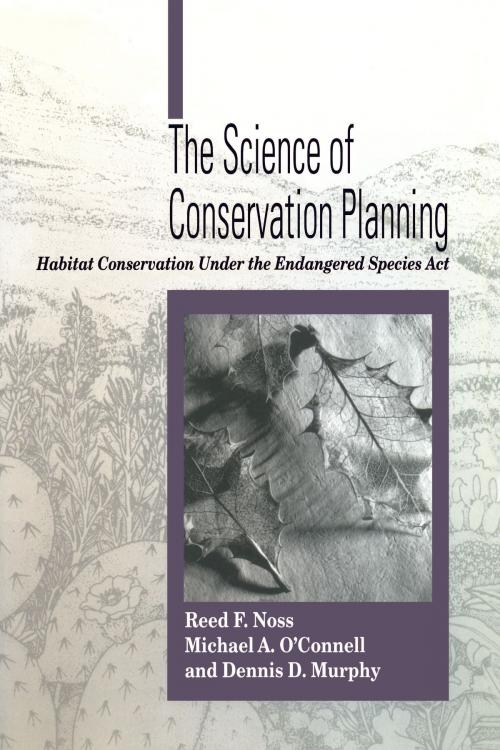The Science of Conservation Planning
Habitat Conservation Under The Endangered Species Act
Nonfiction, Science & Nature, Science, Biological Sciences, Environmental Science, Nature, Environment, Environmental Conservation & Protection| Author: | Reed F. Noss, Michael O'Connell, Dennis D. Murphy | ISBN: | 9781610913409 |
| Publisher: | Island Press | Publication: | June 22, 2012 |
| Imprint: | Island Press | Language: | English |
| Author: | Reed F. Noss, Michael O'Connell, Dennis D. Murphy |
| ISBN: | 9781610913409 |
| Publisher: | Island Press |
| Publication: | June 22, 2012 |
| Imprint: | Island Press |
| Language: | English |
Broad-scale conservation of habitats is increasingly being recognized as a more effective means of protecting species and landscapes than single-species preservation efforts. While interest in the approach has grown tremendously in recyears, it remains controversial and the science behind it has yet to be fully developed.In The Science of Conservation Planning, three of the nation's leading conservation biologists explore the role of the scientist in the planning process and presa framework and guidelines for applying science to regional habitat-based conservation planning. Chapters consider: history and background of conservation planning efforts criticisms of science in conservation planning principles of conservation biology that apply to conservation planning detailed examination of conservation plans specific recommendations for all parties involved.The recommendations, interpretations, and questions provided are thoroughly based in the science of conservation biology, and the framework presented is adaptable to allow for revision and improvemas knowledge is gained and theories refined. The Science of Conservation Planning will serve as a model for the application of conservation biology to real-life problems, and can lead to the developmof scientifically and politically sound plans that are likely to achieve their conservation goals, even in cases where biological and ecological information is limited.The book is essential for scientists at all levels, including agency biologists, academic scientists, environmental consultants, and scientists employed by industry and conservation groups. It is also a valuable resource for elected officials and their staffs, environmentalists, developers, students, and citizen activists involved with the complex and contentious arena of conservation planning.
Broad-scale conservation of habitats is increasingly being recognized as a more effective means of protecting species and landscapes than single-species preservation efforts. While interest in the approach has grown tremendously in recyears, it remains controversial and the science behind it has yet to be fully developed.In The Science of Conservation Planning, three of the nation's leading conservation biologists explore the role of the scientist in the planning process and presa framework and guidelines for applying science to regional habitat-based conservation planning. Chapters consider: history and background of conservation planning efforts criticisms of science in conservation planning principles of conservation biology that apply to conservation planning detailed examination of conservation plans specific recommendations for all parties involved.The recommendations, interpretations, and questions provided are thoroughly based in the science of conservation biology, and the framework presented is adaptable to allow for revision and improvemas knowledge is gained and theories refined. The Science of Conservation Planning will serve as a model for the application of conservation biology to real-life problems, and can lead to the developmof scientifically and politically sound plans that are likely to achieve their conservation goals, even in cases where biological and ecological information is limited.The book is essential for scientists at all levels, including agency biologists, academic scientists, environmental consultants, and scientists employed by industry and conservation groups. It is also a valuable resource for elected officials and their staffs, environmentalists, developers, students, and citizen activists involved with the complex and contentious arena of conservation planning.















